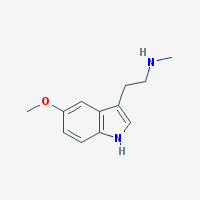Difference between revisions of "5-MeO-NMT"
Endlessness (Talk | contribs) (Created page with "''5-MeO-NMT Molecule''") |
(→Effects) |
||
| (11 intermediate revisions by 3 users not shown) | |||
| Line 1: | Line 1: | ||
[[Image:5meonmt.png|thumb|right|200px|''5-MeO-NMT Molecule'']] | [[Image:5meonmt.png|thumb|right|200px|''5-MeO-NMT Molecule'']] | ||
| + | |||
| + | == Brief overview - What is 5-MeO-NMT? == | ||
| + | |||
| + | 5-MeO-NMT is an alkaloid of unknown psychoactivity | ||
| + | |||
| + | == Chemical and physical properties == | ||
| + | |||
| + | == Effects == | ||
| + | |||
| + | 5-MeO-NMT is believed to produce few or no psychedelic effects, although very little data exists about its pharmacological properties or toxicity. | ||
| + | |||
| + | == Pharmacology, toxicity and general safety == | ||
| + | |||
| + | Unknown activity (Shulgin & Shulgin 1997) | ||
| + | |||
| + | Animal studies mentioned in Ghosal l972a strongly suggest hallucinogenic activity but animal models cannot always be generalized (ref Trout's Notes) | ||
| + | |||
| + | Pharmacological studies: | ||
| + | Robert G. Taborsky, William M. McIsaac 1963 suggests short acting, having "a moderately disruptive effect on conditioned behavior." ref [http://www.dmt-nexus.me/forum/default.aspx?g=posts&t=26137] | ||
| + | |||
| + | Marczynski 1959 & 1960 ref Trout's Notes, Taborsky & Mcisaac 1964 ref Trout's Notes | ||
| + | |||
| + | Metabolism: | ||
| + | Taborsky & Mcisaac 1964 ref Trout's notes | ||
| + | |||
| + | == Plants containing 5-MeO-NMT == | ||
| + | Anadenanthera colubrina var cebil (0.1% of bark as oxalate) (Iacobucci & Rúveda 1964), Anadenanthera peregrina (0.015% in bark) (Schultes et al. 1977). | ||
| + | Arundo donax, | ||
| + | Desmodium gyrans, | ||
| + | Phalaris arundinacea (Boseb &Majaka 1977), Phalaris aquatica, Phalaris tuberosa, | ||
| + | Virola theiodora. | ||
| + | |||
| + | == Extraction teks == | ||
| + | |||
| + | == Dosages and consumption methods == | ||
| + | |||
| + | == History of usage == | ||
| + | |||
| + | == Analysis of 5-MeO-NMT == | ||
| + | |||
| + | == Scientific publications == | ||
| + | |||
| + | == Other links of interest == | ||
| + | |||
| + | {{Page Footer|Allies and Associated Alkaloids}} | ||
| + | [[Category:Alkaloids]] | ||
Latest revision as of 18:15, 30 July 2021
Contents
- 1 Brief overview - What is 5-MeO-NMT?
- 2 Chemical and physical properties
- 3 Effects
- 4 Pharmacology, toxicity and general safety
- 5 Plants containing 5-MeO-NMT
- 6 Extraction teks
- 7 Dosages and consumption methods
- 8 History of usage
- 9 Analysis of 5-MeO-NMT
- 10 Scientific publications
- 11 Other links of interest
Brief overview - What is 5-MeO-NMT?
5-MeO-NMT is an alkaloid of unknown psychoactivity
Chemical and physical properties
Effects
5-MeO-NMT is believed to produce few or no psychedelic effects, although very little data exists about its pharmacological properties or toxicity.
Pharmacology, toxicity and general safety
Unknown activity (Shulgin & Shulgin 1997)
Animal studies mentioned in Ghosal l972a strongly suggest hallucinogenic activity but animal models cannot always be generalized (ref Trout's Notes)
Pharmacological studies: Robert G. Taborsky, William M. McIsaac 1963 suggests short acting, having "a moderately disruptive effect on conditioned behavior." ref [1]
Marczynski 1959 & 1960 ref Trout's Notes, Taborsky & Mcisaac 1964 ref Trout's Notes
Metabolism: Taborsky & Mcisaac 1964 ref Trout's notes
Plants containing 5-MeO-NMT
Anadenanthera colubrina var cebil (0.1% of bark as oxalate) (Iacobucci & Rúveda 1964), Anadenanthera peregrina (0.015% in bark) (Schultes et al. 1977). Arundo donax, Desmodium gyrans, Phalaris arundinacea (Boseb &Majaka 1977), Phalaris aquatica, Phalaris tuberosa, Virola theiodora.
